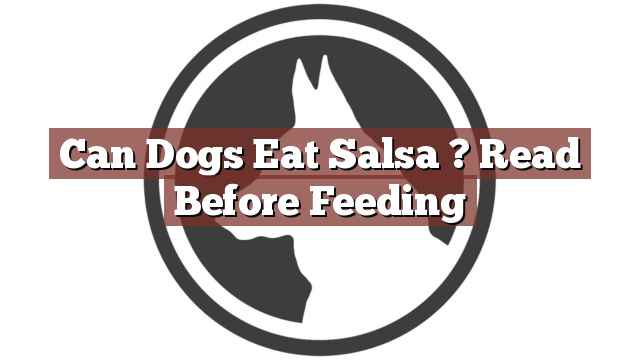Understanding Your Dog’s Dietary Needs
As responsible pet owners, it is crucial to understand our furry friends’ dietary needs to ensure their overall health and well-being. Dogs have different nutritional requirements compared to humans, and certain foods that we enjoy may not be safe for them to consume. Feeding your dog a balanced diet is essential, consisting of high-quality dog food that meets their specific nutritional needs. However, when it comes to sharing human food with our canine companions, caution is advised. Some human foods can be harmful or even toxic to dogs if ingested in large quantities or on a regular basis.
Can Dogs Eat Salsa? Read Before Feeding
Can dogs eat salsa? The answer is no. While salsa can be a flavorful and enjoyable addition to our own meals, it is not suitable for dogs. Salsa often contains ingredients like onions, garlic, chilies, and spices, which are harmful to dogs. Onions and garlic, for example, contain compounds that can damage a dog’s red blood cells and lead to a condition called hemolytic anemia. Chilies and spicy ingredients, on the other hand, can cause gastrointestinal distress, including stomach pain, vomiting, and diarrhea, in dogs. Additionally, the high sodium content in salsa can be problematic for dogs, potentially leading to sodium ion poisoning.
Pros and Cons of Feeding Salsa to Dogs
While it is clear that feeding salsa to dogs is not recommended, let’s briefly discuss the pros and cons of this practice. One possible advantage of feeding salsa to dogs is that it may add some variety and flavor to their food. However, this benefit is outweighed by the potential risks. The cons of feeding salsa to dogs include the aforementioned dangers of onion, garlic, chilies, spices, and high sodium content. Furthermore, dogs have different digestive systems and metabolisms than humans, making it difficult for them to properly process and digest certain ingredients found in salsa.
Conclusion: Weighing the Risks and Benefits of Salsa for Dogs
In conclusion, it is best to avoid feeding salsa to dogs. The potential risks, such as onion and garlic toxicity, gastrointestinal distress, and sodium ion poisoning, far outweigh any potential benefits. As responsible pet owners, we must prioritize our dogs’ health and choose foods that are safe and suitable for their dietary needs. If you have doubts about whether a particular food is safe for your dog, it is always recommended to consult with a veterinarian before introducing it into their diet. Remember, a well-balanced and nutritionally complete dog food is the best way to ensure your furry friend’s optimal health and happiness.
Thank you for taking the time to read through our exploration of [page_title]. As every dog lover knows, our furry friends have unique dietary needs and responses, often varying from one canine to another. This is why it's paramount to approach any changes in their diet with caution and knowledge.
Before introducing any new treats or making alterations to your dog's diet based on our insights, it's crucial to consult with a veterinarian about [page_title]. Their expertise ensures that the choices you make are well-suited to your particular pet's health and well-being.
Even seemingly harmless foods can sometimes lead to allergic reactions or digestive issues, which is why monitoring your dog after introducing any new food item is essential.
The content provided here on [page_title] is crafted with care, thorough research, and a genuine love for dogs. Nevertheless, it serves as a general guideline and should not be considered a substitute for professional veterinary advice.
Always prioritize the expert insights of your veterinarian, and remember that the health and happiness of your furry companion come first.
May your journey with your pet continue to be filled with joy, love, and safe culinary adventures. Happy reading, and even happier snacking for your canine friend!

